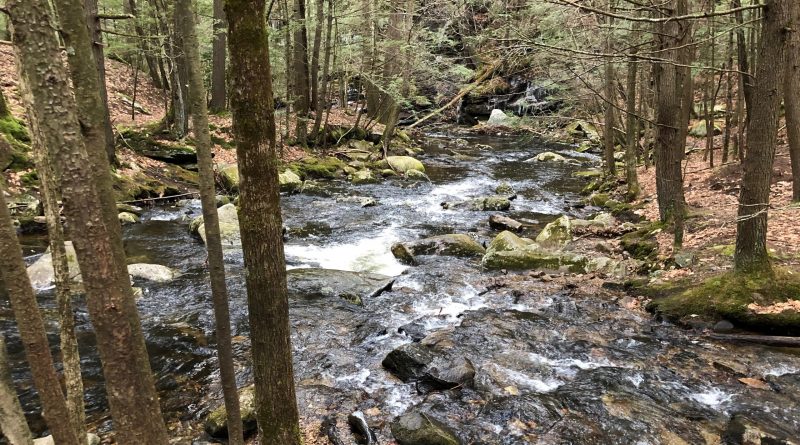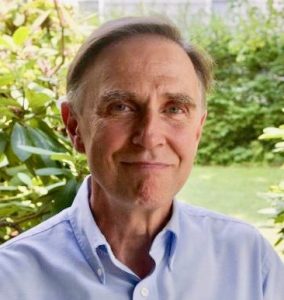Opinion: Love, Justice, and Climate Change. Living Lightly on the Earth

A brook in Western Massachusetts. Photo: Russ VernonJones

I like the creature comforts of my middle-class lifestyle. At the same time I believe in global equity. I’m sure that I’m using more than my fair share of the world’s resources and that the planet could not accommodate 7.8 billion people consuming as much as my neighbors and I do.
I’ve written about many climate action steps we can take, many of which won’t require much change in our lifestyles. Today I want to invite you (and me) to consider the almost certain reality that solving the climate crisis will require reduced consumption and reduced energy use by most of us in the so-called “developed” nations.
So many of us have been conditioned to believe that more is better, that it can be challenging for us to think in this area. I’m hardly an expert. Rather than trying to provide answers, I’d like to share three experiences. I hope that reflecting on these experiences can create some space for you (and me) to think about consumption, lifestyles, and our positions in the world — a world with 7.8 billion people and a climate crisis.
First Experience — Live Lightly On The Earth
A couple of years ago I participated in a weekend group retreat where we tried to put together a summary of the key actions that humanity needs to take to address the climate crisis equitably. We made a long list — from ending fossil fuel extraction, to mass transit, to international finance, to dismantling racism, etc. What I’ve never forgotten, though, came from two of our members, one an indigenous woman and the other a man who had lived and worked with indigenous people. They said that the key to everything we were talking about is learning to “live lightly on the earth.”
I’m still thinking about what that means. I know it means lowered consumption, fewer possessions, less travel. I’m sure it will mean using the things that we have for a long time and rarely getting new things. I’ve found it a useful idea to hold in my mind. It is a concept that is important for individuals, but it also must be implemented through social and governmental policies and practices that help wean our society from our addiction to consumption and always having to have more.
Second Experience — Prosperity Without Growth
Not long after the Green New Deal (GND) came out, I had the opportunity to hear a talk by Rhiana Gunn-Wright, a young Black policy expert who was a lead designer of the original GND proposal. She is brilliant and engaging. I got to speak with her briefly after her talk, and asked her about the extent to which the GND seemed to call for a lot of economic growth and whether that was consistent with ending climate change. She immediately agreed that was an issue and said, “We’ve got to learn how to think about prosperity without growth.”
The idea that those two could be decoupled did not fit easily into my mental structures. Growth has been the primary goal of economic policy in this country for years. What type of changes will be necessary in our economic system to keep things going without endless growth? Our current system doesn’t give most people a fair share of the economic pie. It also fails to leave people feeling secure or feeling a part of a unified society. Clearly some big changes are needed. How do we move toward an economic system that works for everyone and doesn’t destroy the planet by needing endless growth?
Third Experience — Doughnut Economics
Just recently, as I was surfing the Internet trying to keep up with news about the climate crisis, I clicked on a link to something called “doughnut economics.” I listened to a TED talk by Kate Raworth, the originator of this different way of thinking about economics. It has nothing to do with sweet pastries. It gets its title from the shape of a diagram used to explain its basic premise. Here was an economist talking about growth not being the goal!
I’ll write more about this in my next post, but the basic idea is that our economies need to be designed, as Raworth writes, “to meet the needs of all within the means of the planet. In other words, to ensure that no one falls short on life’s essentials (from food and housing to healthcare and political voice), while ensuring that collectively we do not overshoot our pressure on Earth’s life-supporting systems, on which we fundamentally depend.” The doughnut economic folks don’t yet have a blueprint for accomplishing this, but they do have some very promising ideas.
Meanwhile, I invite you to reflect on these three little stories. What thoughts do you have about how your lifestyle fits on a planet with finite resources and lots of other people? How do you feel about being invited to consider the need to limit our consumption, not for personal financial reasons, but because of planetary limits? Please leave a comment.
Russ Vernon-Jones was the Principal of Fort River Elementary School from 1990 to 2008. He is a co-facilitator of the Coming Together Anti-Racism Project in the Amherst area. He chairs the Racism, White Supremacy, and Climate Justice working group of Climate Action Now of Western Mass., and blogs regularly on climate justice at www.RussVernonJones.org.

Russ, thank you for this beautiful piece that gets to the very essence of what we need to think about and do to help prevent major climate disruption. I hope readers will consider, post COVID, whether they can continue to travel and explore locally, consume less, and generally downsize. Simpler lives would provide less stress and they would be our gift to the planet.